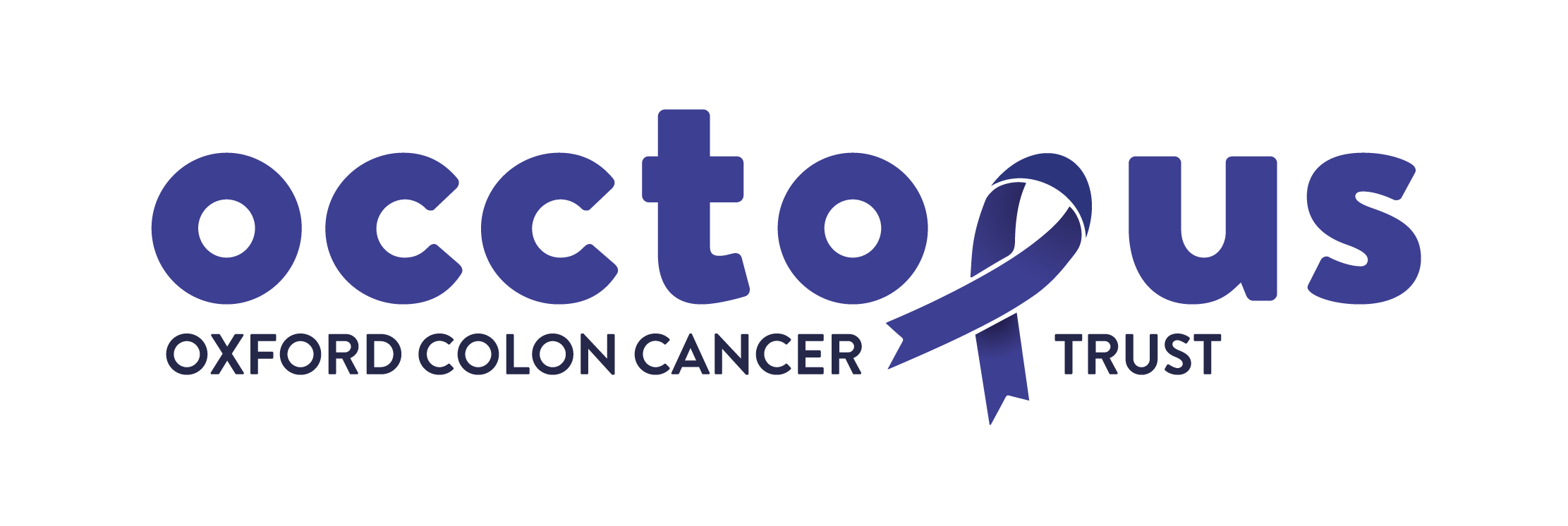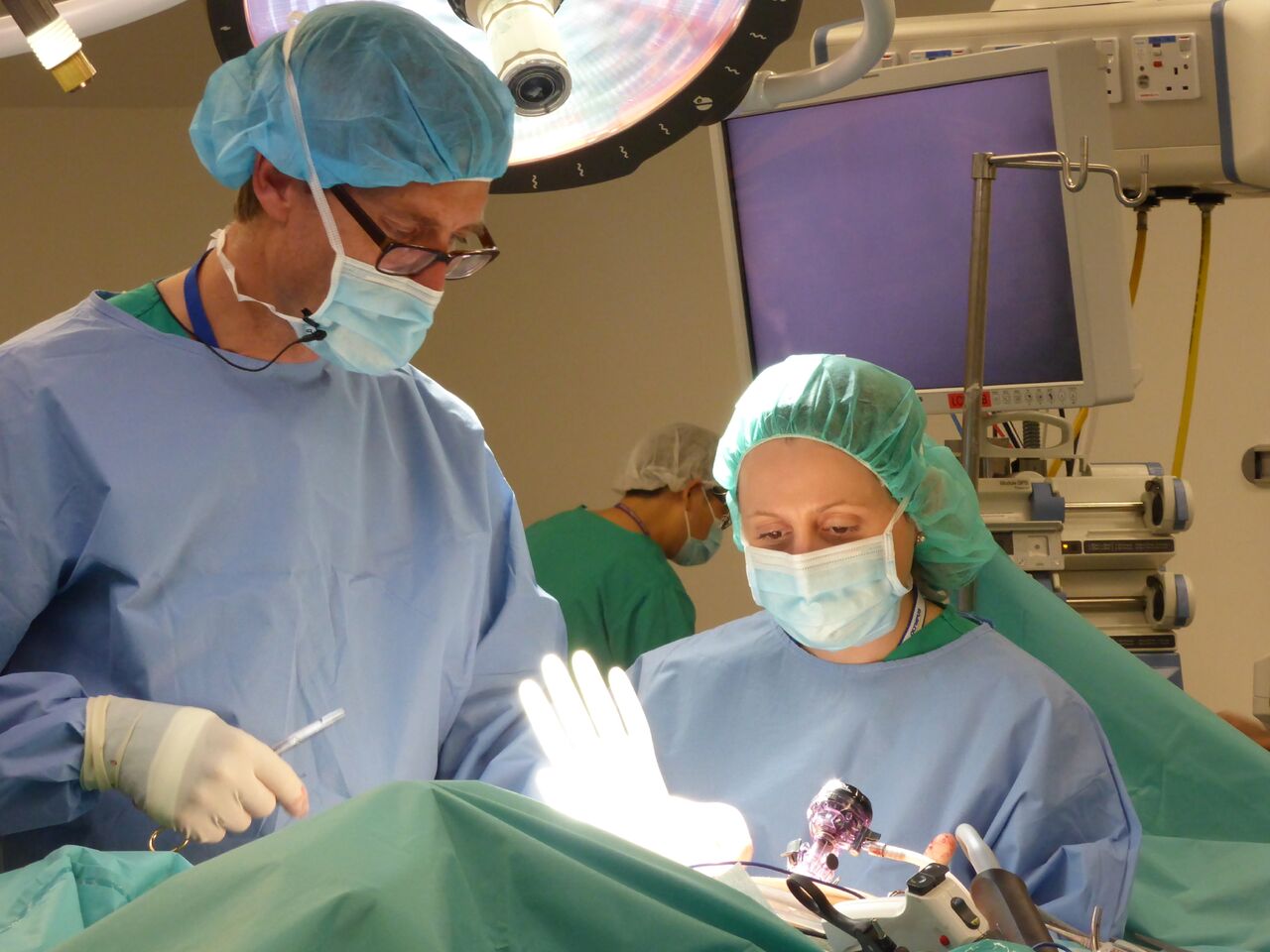As we come to the end of our 20th year of leading-edge research and treatment in colon cancer, Crohn’s and colitis we wanted to take a moment to step back and reflect on our past two decades and our incredible achievements along the way starting with the charity’s creation in 2003.
2003
A reminder of where it all began and what we do…
UK charity Oxford Colon Cancer Trust, nicknamed Occtopus, was formed in 2003 by consultants and former patients of Oxford University Hospitals (OUH). It supports the colorectal department but is independent of it and this independent structure makes it an agile and practical charity. We promote surgical innovation, training, education and research into colorectal cancer, Crohn’s, colitis and continence in order to promote earlier diagnosis, bring about new treatments and enhance patient outcomes. The charity delivers this objective by designing, funding and implementing defined initiatives in agreement with OUH and other partner bodies.
The charity was set up by Neil Ashley and Professor Neil Mortensen – who is a Professor of Colorectal Surgery in the University of Oxford Medical School and now the charity’s Chair – due to the dynamic duo’s passion for better patient outcomes for those experiencing colorectal diseases.
Pictured: Neil Ashely in 2003
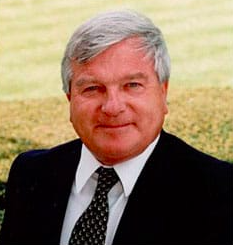
Pictured: Professor Neil Mortensen in 2003

During 2005 to 2008 the charity raised £500,000 in donations and £250,000 in equipment sponsorship from Olympus to create Oxford’s first integrated key hole operating theatre, kickstarting Occtopus’ launch with a bang.
2009 – 2012
In the charity’s early years, it concentrated on funding the purchase of laparoscopic equipment, the training of medical staff for the introduction of robotic colorectal surgery, and it looked out for opportunities for translational research. These were in the application of surgical technology and for designing and executing substantial projects in collaboration with OUH, not only for new technology but also in teaching, training and research. All projects were innovative and progressive and paved the way for Occtopus’ following 20 years of success.
2013 – 2016
Between 2013-2016, the charity’s focus was to enable progress in minimally invasive colorectal surgery in the UK. The charity achieved sufficient funds to purchase high-definition laparoscopes, upgrade the computerised audit system, support the introduction of robotic surgery. A world first was the use of the robotic platform to carry out robotic assisted transanal endoscopic microsurgery (known as TEMS, this is a procedure performed entirely through the anus and rectum and offers an effective, quick-recovery treatment to completely remove large rectal polyps and early-stage rectal cancer). The charity also focussed on robotic surgery for low rectal cancer through the abdomen.
Pictured: Robotic assisted Transanal Endoscopic Microsurgery (TEM) carried out in Feb 2014
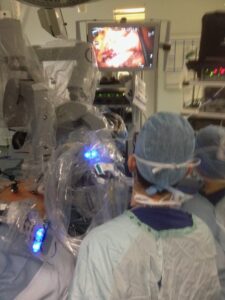
2016 – 2019
From 2016-2019, Occtopus committed £120,000 to fund a research fellowship through the Nuffield Department of Surgical Sciences focussing on the procedure of Transanal Total Mesorectal Excision (TaTME) in the treatment of bowel cancer. TaTME is a minimally invasive robotic alternative to conventional surgery for patients with lower rectal cancer. The research was aimed at three areas, firstly the safety and efficacy of the procedure in the short term, secondly the quality of life of patients after surgery and finally the functional outcomes for the patient. The necessary education and training required to undertake the procedure successfully was a key point of the study. The programme included the setting up of one of the most rigorous and comprehensive databases of medical assessment, treatment regime and patient outcomes.
Marta Penna and her team using the TaTME equipment, a research and equipment project funded by Occtopus

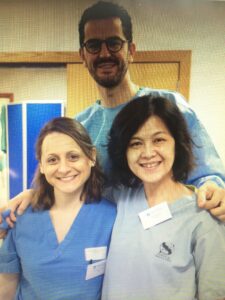
Marta Penna talking at a TaTME Congress
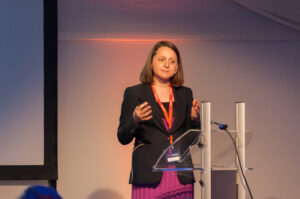
2017
In 2017, the charity funded two individual research grants. The first was the assessment of a 13-gene extracellular matrix signature for predicting prognosis as well as radio-sensitivity and outcome in rectal patients (known as Gene Signature which is information about the activity of a specific group of genes in a cell or tissue). The second research grant was for an observational study to correlate the results of ploidy and stroma analysis as biomarkers to the prognosis in early rectal cancer (Ploidy and Stroma Analysis).
2018
In 2018, the charity launched a campaign to support the stoma and colorectal nursing teams in Oxford through the provision of newer equipment like stoma mannequins, hegar dilators and Stanley trolleys to make it easier for them to provide better care. Our campaign also funded the annual Stoma Care Open Day at the John Radcliffe Hospital and helped to set up an independent Patient Support Group.
2019
In late 2018 – 2019, we were the fund facilitating the TaTME training workshops, which were established to look at ways to implement a national training programme for the next set of learners. Five learning teams were chosen to benefit from this comprehensive training initiative at five separate sites. Work was then undertaken to set up honorary contracts for mentors at each learning site, and to set up the research protocols and arrange installation of the telementoring system (called Proximie) which enables hospitals, surgeons, and medical device companies to capture data, share information from anywhere, and generate new insights so they can improve outcomes and productivity) which was used to record each training case. We proudly helped with the funding arrangements for this national training scheme.
The assessments from this programme were meticulous and in 2020 when colleagues in Norway and the Netherlands suggested a pause in the use of the technique because of concerns over local recurrence, the data from this work have been used to check the UK outcomes. There has not been a proven increase in adverse outcomes, since confirmed in other countries.
2021-2022
In January 2021, the charity received a legacy donation of £200,000 to establish a three-year Research Fellowship.
The charity provided funds amounting to £40,000 to the Royal College of Surgeons of England to part fund a Robotics research fellowship using some of the support provided by the Dr Elman Poole Research Fellowship bequest. Charlotte El-Sayed is a trainee surgeon with an interest in robotics, and this is a two to three year project. She has so far carried out reviews on measures used to assess performance metrics whilst learning robotic surgery. The REINVENT study , Robotic Surgery Innovation for Efficient Training, will look at the barriers to and solutions for best training in robotic surgery. After review this project has been supported with further grants of £40,000 and £30,000
The Trustees agreed in principle to fund a Pilot Study on the use of autologous stem cells (cells obtained from the same individual) for treatment of anal fistulas in Crohn’s disease as a limited proof of concept which would be a unique project in the UK. The various regulatory arrangements have now been fulfilled and the project is about to start this year.
Occtopus is also funding a Patient Preference Study, to better understand patient choice in the multimodality treatment of rectal cancer. This is a collaborative project between the Supportive Cancer Care Research Group (Oxford Brookes University) and the Department of Colorectal Surgery.
2023
In Spring 2023, in Occtopus’ 20th year, the charity appointed a new Communications Manager, Liz Ashworth, in a freelance position to keep costs low, enabling more of every donated pound to go towards its charitable aims whilst also bolstering the much needed communications element of the charity to grow the charity over the next 20 years. Occtopus also partly funds an OUH data manager, Ellen Gregory, to enhance the national and international research capability of the OUH colorectal department.
Currently, the charity is chaired by Prof Neil Mortensen and has three eminent Patrons: Neil Ashley (founding Chair), Prof Sir Walter Bodmer and Prof Peter Atkins. It has nine Trustees with a wide range of senior management expertise: Prof Bryan Morton CBE, Rob Jonckheer (Secretary), Nick Handy (Treasurer), Mark Rowse, Phil Williams, Prof Chris Cunningham (Consultant Colorectal Surgeon), Kat Baker (Consultant Colorectal Surgeon), Oliver Jones (Consultant Colorectal and General Surgeon) and Simon Holland.
To date, Occtopus has raised over £1,000,000 and funded two integrated theaters, one at the John Radcliffe Hospital and latterly at the Surgery and Diagnostics Centre at the Churchill Hospital.
It part funded the first Da Vinci robot to be installed in Oxford (pictured below).
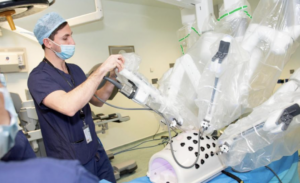
Professor Neil Mortensen, Chair of Occtopus charity summarises: “As we look to the future, we wanted to say a huge thank you for everyone’s support as we continue to pioneer new research, improve patient outcomes, and hope for those experiencing colorectal disease. We know you will continue to support us as we grow and create a leading centre of excellence in Oxford which will continue to have a national impact on all patients and staff.”
Occtopus continues to look out for innovative research projects and will be launching a number of new fundraising initiatives in support of its newly approved and future projects.
To support the work of Occtopus, please click here https://www.justgiving.com/oocct
